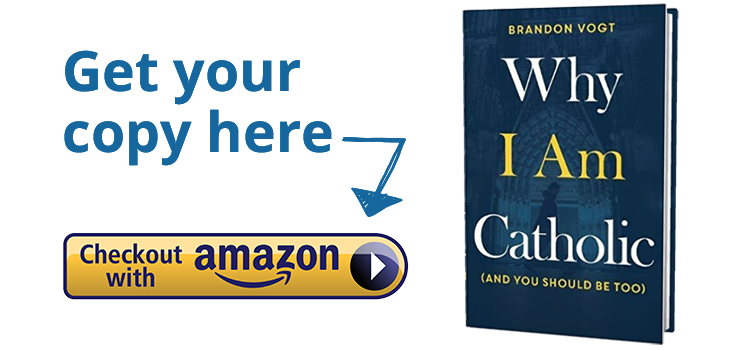As the Vatican kicks off a four-day summit addressing the Church’s sexual abuse crisis, I’ve been asked by many non-Catholic friends, “Why are you still Catholic? How could you remain tied to such a dirty institution?” Those questions are especially pointed given that my latest book was bluntly titled Why I am Catholic (And You Should Be Too).
Since I wrote the book over a year ago, before revelations of then-Cardinal McCarrick and the horrific “summer of shame,” I barely addressed the abuse crisis. It just wasn’t a burning issue at the time. In fact, up until 2018, in surveys asking former Catholics why they left the Church, the sex abuse crisis never appeared among the top three responses in any survey I saw.
But that’s all changed. More recent surveys put the abuse crisis at the top of almost every list. The crisis has dominated the news coverage, both religious and secular, and it’s an issue no Catholic can ignore, especially ones trying to convince others to become Catholic, too.
So when my publisher, Ave Maria Press, told me that after strong sales of the hardcover edition, they wanted to release a paperback version of the book (which you can order here), we both agreed it should feature a new preface that addresses this topic explicitly, especially as it’s now become the number one reason not to become Catholic.
They graciously allowed me to share the full preface below. Enjoy, and be sure to pick up your copy of the new paperback edition of Why I am Catholic!
Preface from new paperback edition of Why I am Catholic (And You Should Be Too)
Recently, while in Rome for some meetings, I had a chance to visit some of the city’s popular plazas and squares with friends and a video camera. Our goal was to interview young people at random and discover what they thought about God, religion, and the Catholic Church.
We asked simple questions like “What is God?”, “Can you name any saints?”, and “What’s the most important thing Jesus ever did?” Most of the answers were confused or disappointing. “I don’t know” was the most common reply. But one question generated lots of responses. We asked young people, “What’s the best and worst thing the Catholic Church has ever done?” Only a few people could think of anything good associated with the Catholic Church. Some gestured to the beautiful artwork and churches that surrounded us in Rome. One young woman acknowledged that the Catholic Church greatly helped the poor (“but a long time ago,” she added, “not so much now”).
Most revealing were the answers to the second part of that question, about the worst thing the Church has ever done. Several people mentioned the Inquisition or the Crusades. However, by far the most common answer was “the sexual abuse of kids.” Nearly everyone mentioned it. Most strikingly, one person reflected for a moment, then said, “It’s tough for me to answer that question because I honestly don’t know which is worse: killing people or raping young kids.”
Between the publication of the first edition of this book in October 2017 and these street interviews a year later, the Church was rocked by new revelations of sexual abuse and cover-up. Many American Catholics thought that after the bombshell abuse revelations in 2002, the worst was behind them. They were wrong.
An avalanche of new scandals tumbled into the news, from the account of a high-ranking Cardinal accused of abusing young men to grand jury reports chronicling decades of abuse against hundreds of victims in one state alone. The stories are harrowing. Even the few I read made me nauseated and enraged, especially as a father of six young children. And though the majority of these cases occurred in the past—mostly during the fifties, sixties, and seventies—it’s clear that many Church leaders still don’t recognize the gravity of these abuses.
Those initial reports have since been followed by near-daily revelations of sexual impropriety at seminaries, bishops shuffling abusive priests between parishes, and Church leaders not only failing to address the problems but also actively participating in them.
Without question, the revelations of the summer of 2018 have established the last few decades as one of the darkest periods in American Church history. And that has caused many Catholics to understandably wonder why they should remain Catholic. How can I remain associated with such a corrupt institution? How can I keep my children in Catholic parishes and schools if the Church seems incapable of protecting them from sexual abuse? These are questions I’ve asked myself.
At the same time, people outside the Church who are considering becoming Catholic must wonder, Why should I become Catholic in light of all this sickening news? Wouldn’t life be easier in some other church or religion? Those are good questions, too.
So, in a book titled Why I Am Catholic, I can’t avoid the elephant in the room, the most obvious reason not to be Catholic: the sexual abuse crisis. In response, I’ve written this preface to answer why I, a Millennial Catholic, young husband and father, remain Catholic despite these horrific cases of abuse and cover-up.
The main answer is that I’m Catholic because of Jesus, not because of the leaders of the Church. As you’ll see in this book, the principal reason to become Catholic is because you’re convinced Catholicism is true and you believe what the Church teaches about faith, morals, and its own identity. I’m convinced Catholicism is true because of Jesus. I believe the Church wasn’t just started by a group of bumbling bureaucrats but by Jesus himself, God in the flesh.
It’s Jesus I’m drawn to, Jesus I’m committed to, and Jesus I trust. It’s true that Catholics are often drawn to the faith by charismatic leaders, warm parish communities, or impressive schools. There’s nothing wrong with those entry points, as long as we remember that our faith is not ultimately rooted in those things and isn’t compromised when they fail.
As a Catholic, my faith is in Jesus Christ, not his followers. When sin and evil swirl through the Church, I keep my eyes fixed on that reliable center, that untainted source of the Church’s authority and attraction: Jesus.
My second answer is that I know that the sexual abuse crisis is not indicative of the entire Church. The percentage of priests and bishops complicit in these crimes is relatively low (smaller, in fact, than in many other religions). The vast majority of priests and bishops are good, holy men who are just as disgusted as the laity about this abuse. Some of my closest friends are priests and they’re among the most selfless, virtuous people I know.
One reason there’s so much outrage over sexually abusive priests is because most people know, intuitively, that priests are supposed to be moral exemplars. I’m convinced most still are, and it’s a reason I remain close to them.
My third and final answer is that I remain Catholic because I want to be part of the solution. The Church is not just an institution but also a family, and when your family faces a crisis, you don’t flee—you stay and help. When we experience evil or terror, our natural reaction is to run. That’s understandable; we’re scared and scandalized.
But for Catholics, the Church is our family and home; and when evil threatens your family or home, you don’t give up and run away. You batten down the hatches. You plant your feet. You resolve, “This is my home, and I will not let evil destroy it.”
Or, to switch metaphors, when a family member has cancer, you don’t just give up on them and leave. You move closer to them. You resolve to stay by their side and help battle the cancer. You give all you can offer.
That’s what the Catholic Church needs now. In times of crisis—and there have been many such crises throughout the Church’s history (and indeed there will be more)—the Church summons new heroes who are committed to holiness and driven to uproot whatever sin and evil have infected the spiritual family.
So, scandals don’t push me away from the Church, just as a relative’s cancer diagnosis doesn’t push me away from her. In both cases, the evil demands a heroic resolve to stay and fight, to be part of the solution, especially on behalf of the victims.
I want to be very clear: these sexual abuse cases are horrific. There’s no downplaying them or justifying them or explaining them away. They’re egregious and scandalizing. But Catholicism doesn’t fall when its members fail. I’m Catholic not because Church leaders are perfect, but because the Church channels to me the love and forgiveness of Jesus in unparalleled ways: his body and blood in the Eucharist, his forgiveness in Confession.
Life may seem easier outside the Church. But these divine treasures are only found within, and they carry Catholics through even the darkest of times.


